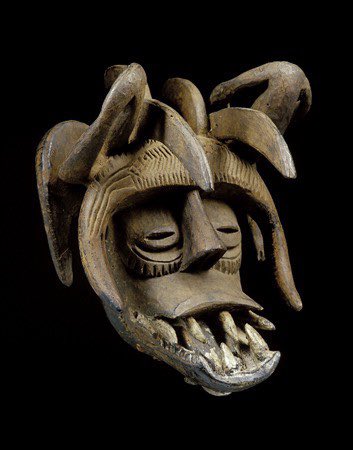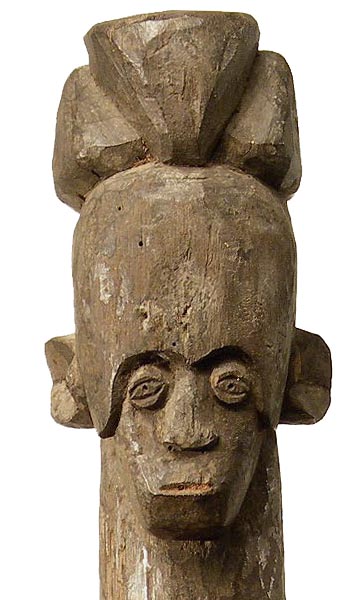Every culture, ancient and contemporary, has sought to explain the profound mystery of creation. Among the diverse cultural groups in Nigeria, the Igbo people stand proud with a rich and captivating creation myth that reflects their deep spiritual beliefs and worldview. Rooted in oral tradition, the Igbo creation myth weaves a tapestry of divine beings, cosmic forces, and primordial elements that shape the origins of the universe and the destiny of humanity. In this article, we delve into the enchanting world of the Igbo creation myth, exploring its key characters, symbolic imagery, and the profound lessons it imparts.
1. The Primordial Void: The Universe in its Infancy
In the beginning, according to the Igbo creation myth, the universe was an expanse of chaos and formlessness. There existed a primordial void known as "Chukwu," the supreme deity and the ultimate source of all creation. Chukwu, the cosmic force beyond human comprehension, was omnipotent, omniscient, and omnipresent, transcending all space and time.

Within the infinite void, two divine beings emerged: "Chukwu-Okike," the Great Creator, and "Eke," the Cosmic Serpent. Chukwu-Okike symbolized the creative force and benevolence of the universe, while Eke represented the cosmic energy and transformative power.
In the Igbo cosmology, Chukwu-Okike is often associated with the sun, which sustains life and provides warmth and nourishment to all living beings. Eke, the Cosmic Serpent, is linked to the moon, which regulates the tides and influences the cycles of life and nature.
2. The Dance of Creation: Chukwu-Okike and Eke
As Chukwu-Okike and Eke came into existence, they embarked on a cosmic dance, representing the eternal cycle of creation and destruction. Their movements echoed through the void, giving rise to the rhythm of life and the ebb and flow of the universe.
With each step, Chukwu-Okike brought forth the elements of creation - the earth, water, fire, and air. Eke, in turn, infused these elements with the divine energy, shaping the cosmos and infusing it with vitality.

The dance of Chukwu-Okike and Eke echoed through the infinite void, bringing harmony and order to the previously chaotic expanse. In this way, the universe was born, a harmonious symphony of divine energies and elemental forces.
The Igbo people believe that the universe is not static but rather in a constant state of flux and transformation, a reflection of the ongoing dance of creation and destruction enacted by Chukwu-Okike and Eke.
3. The Creation of Humanity: The Progenitors of the Earth
As the cosmic dance continued, Chukwu-Okike and Eke realized that the universe needed beings to inhabit and appreciate its beauty. They combined their divine essences, shaping the first human beings - the progenitors of the earth.
These primordial humans were imbued with divine knowledge, wisdom, and the spark of Chukwu-Okike's creative power. They were designed to be stewards of the earth, custodians of its resources, and bearers of its sacred wisdom.
Chukwu-Okike and Eke breathed life into these newly created humans, endowing them with the gift of free will and the ability to make choices. The progenitors were placed in the Garden of the Earth, a lush and bountiful paradise where they lived in perfect harmony with nature and each other.
In the Garden of the Earth, the primordial humans lived in communion with the divine, guided by the principles of love, harmony, and respect for all life. They understood their interconnectedness with the cosmos and the sacredness of creation, and they revered Chukwu-Okike and Eke as the divine architects of the universe.
4. The Fall from Grace: The Loss of Divine Innocence
In the Garden of the Earth, the primordial humans thrived, enjoying the bountiful blessings bestowed upon them by Chukwu-Okike and Eke. They lived in a state of bliss and harmony, with no pain, suffering, or conflict.
However, as time passed, the progenitors became complacent and forgot the sacredness of their existence. They strayed from the path of divine harmony, allowing greed, jealousy, and ego to cloud their hearts.
Their actions displeased Chukwu-Okike, who had bestowed them with the precious gift of free will. As a consequence of their choices, the progenitors were banished from the Garden of the Earth, their divine innocence lost.
The expulsion from the Garden of the Earth is akin to the biblical story of Adam and Eve's fall from grace in the Garden of Eden. It serves as a cautionary tale of the consequences of straying from the path of divine harmony
and succumbing to the temptations of the ego.
5. The Quest for Redemption: A Journey of Spiritual Evolution
Separated from the divine presence, the progenitors embarked on a journey of spiritual evolution and self-discovery. Guided by the wisdom of the cosmic serpent, Eke, they learned the value of humility, compassion, and harmony with the universe.
In their quest for redemption, the progenitors faced trials and tribulations, navigating the complexities of the human experience. They experienced joy and sorrow, success and failure, love and loss, all integral to their growth and understanding of their place in the cosmos.
Through their trials and tribulations, the progenitors discovered the importance of spiritual awakening, self-awareness, and the interconnectedness of all life. They realized that Chukwu-Okike's divine presence permeated every aspect of existence, and that they, too, held the potential for divine creation within themselves.
The journey of the progenitors is a metaphor for the human experience of seeking redemption and spiritual growth. It reflects the Igbo belief that every individual has the capacity for transformation and self-discovery, regardless of past mistakes or missteps.
6. The Legacy of the Igbo Creation Myth: A Blueprint for Humanity
The Igbo creation myth is more than a tale of cosmic forces and divine beings; it holds profound wisdom and moral lessons that resonate with the human experience. It emphasizes the sacredness of creation and the responsibility of humanity to coexist harmoniously with the earth and its inhabitants.
The fall of the primordial humans from grace mirrors the challenges faced by humanity throughout history - the consequences of greed, hubris, and the loss of connection with the divine. However, it also offers hope in the form of redemption and spiritual growth, highlighting the human capacity for transformation and self-discovery.
The Igbo creation myth teaches that the universe is a delicate and intricate web of interconnections, and that every individual has a vital role to play in maintaining its harmony. It encourages humility, respect for all life forms, and an understanding of the cyclical nature of existence.
The concept of interconnectedness in the Igbo creation myth aligns with the modern understanding of ecological balance and sustainability. It underscores the significance of caring for the earth and its resources, recognizing that the well-being of humanity is intricately linked to the well-being of the natural world.
The myth also emphasizes the importance of free will and the power of individual choices. It encourages personal responsibility and accountability for one's actions, recognizing that every choice has consequences that ripple through the interconnected fabric of existence.
Conclusion
The Igbo creation myth is a masterpiece of oral tradition, a poetic tapestry that weaves together divine beings, cosmic forces, and the essence of humanity's journey. It reflects the deep spiritual beliefs and philosophical insights of the Igbo people, offering profound wisdom and moral lessons for humanity as a whole.
The myth's enduring significance lies in its portrayal of the interconnectedness of all life, the cyclical nature of creation, and the potential for spiritual evolution. It invites us to contemplate our place in the grand tapestry of the universe and the responsibilities we bear as custodians of the earth.
Through the Igbo creation myth, we are reminded of the sacredness of existence, the power of free will, and the transformative potential of human choices. It stands as a timeless testament to the enduring power of mythology, passing down wisdom from generation to generation and preserving the essence of the Igbo people's spiritual heritage. In embracing this myth, we gain insight into the deeper mysteries of the universe and find inspiration to nurture harmony, compassion, and reverence for all life on our shared cosmic journey.
References
“God of the Day - Religion - Nigeria.” Nairaland, the Nigerian Forum, 2011.
https://www.nairaland.com/750669/god-day.
Igbo Tribe Nigeria Ikenga Alusi Statue Chukwu David Howard Tribal Art African Igbo
Tribe Nigeria Ikenga Alusi Statue Chukwu, 2014.
http://tribalartasia.com/IGBO/IGBOLARGE/IGBO4.html.
Join the Oriire Community
Become a free member to bookmark your favorite stories, join the discussion and personalize your experience.
















Share
0 Comments